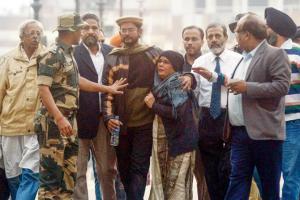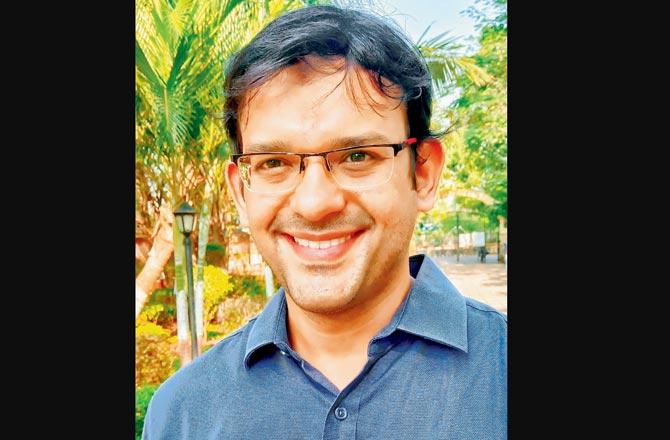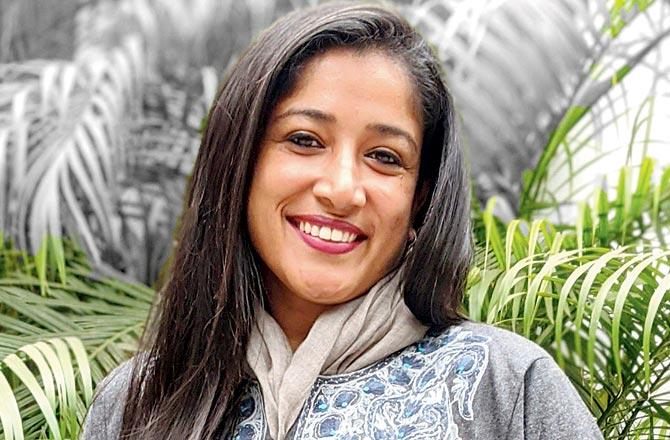Mumbais Hamid Ansari, who crossed the border to save a Pakistani woman from forced marriage under the waani custom, recounts the ordeal, and why his past continues to catch up with him

Hamid Ansari (centre), accompanied by his mother Fauzia Ansari, father Nehal Ansari (second, right) and brother Dr Khalid Ansari (third, right), at the India Pakistan Wagah border on December 18, 2018. Pic/AFP
An extraordinary life doesn't necessarily mean a journey that's exemplary or inspirational. Sometimes, it could mean experiencing the unfathomable, and living to tell it. The story of Hamid Ansari, a 27-year-old Mumbai-based techie, who disappeared into thin air in the nippy November of 2012, is extraordinary for those reasons. Even as his parents, Fauzia and Nehal, and brother Khalid, were running from pillar to post to trace his whereabouts, an undiscerning Hamid, on a mission to rescue Fiza, a young woman he befriended online, had found himself across the border in Pakistan, and illegally. The tragedy that befell him soon after is revisited in a new book, Hamid: The Story of My Captivity, Survival and Freedom (Penguin Random House), which Hamid has co-authored with senior journalist Geeta Mohan.
Hamid had been missing for nearly three years, before the Ansari family, who had traversed political and diplomatic hurdles, learnt that he was still alive. By then, he had surreptitiously been tried and charged for being an Indian spy in Pakistan. An equal number of agonising years followed, before he crossed over from the Wagah border on December 18, 2018, and was united with the family. Mohan, the foreign affairs editor with a national media house, had been following Ansari's story, from the time it broke in the media. "I was deeply involved in it, not just as a journalist, but also personally. Every time Fauzia would come to Delhi, I'd go and meet her. It was important [for me] to raise the issue with the authorities, primarily, because Hamid was still languishing in prison, and he wasn't a 'spy'," she tells mid-day. The idea to pen a book came closer to his date of repatriation.

Hamid Ansari
His journey, by his own admission, began on an "innocent" note. In November 2011, a year before the ordeal, Hamid had a comfortable job as global replenishment senior executive at Hettich GmBH in Mumbai. Around that time, he went on a trip to Matheran with friends, who introduced him to the online chat platform, Nimbuzz. Here, he met Fiza, a 25-year-old from Kohat in Pakistan, and the two developed a strong attraction for each other, which spilled over daily chats and calls. What changed the dynamics was when Fiza's brother shot a neighbour dead, and she had to pay the price for it. The community elders had invoked waani, a custom where a girl's hand is given in marriage to the aggrieved party as a form of compensation. Unable to accept her fate, Fiza reached out to Hamid, asking him to rescue her. That was the last he heard of her. Fearing that she would take a drastic step, Hamid who was then an active member of the Rotaract Club, attempted to enter Pakistan through legal channels, but failed. He finally took the ill-advised decision of entering Pakistan via Kabul, Afghanistan, on the suggestion of a local, Atta-ur-Rahman, who eventually tipped off the authorities. The hellish incarceration, which he recounts in the book, is gut-wrenching and a grim reminder of how the "enemy nation" rhetoric can impact individual lives. "It wasn't easy reliving those memories [for the book]," admits Hamid, who until recently was part of the visiting faculty at a junior college in Mumbai. "I still have nightmares from those days." For the longest time, he was in solitary confinement in a dingy cell that was 20 feet below ground level—where he was tortured, beaten, chained, and given a sleeping bag, which smelled of urine, dysentery and semen, to overcome the nail-biting winters. "I was shocked at how vividly he remembered that experience, including the dates. For me, to put that to paper wasn't as difficult," says Mohan.
Despite being pressured into "confessing" that he was a RAW agent, Hamid refused to budge. "I was labelled a spy. They wanted to know what my mission was. Even for argument's sake, if I had accepted [that I was an agent], how would I prove it? Somewhere deep down, I knew that my truth would prevail." At one point, his thumb impression was forcefully taken on a sheet of paper, which had a false confession. "That was the point I felt like I would never return home."

Geeta Mohan
Mohan, who has witnessed many a case that could go wrong, says that while "there is a lot of romanticism in the idea of truth," the fact is that it doesn't hold when it comes to India and Pakistan. "There are so many people still behind bars, and Sarabjit [Singh Attwal, convicted of terrorism and spying by a Pakistani court] is a case in point. If authorities don't want you to return, they can move mountains to make it possible."
What worked in Hamid's favour, is the role of Zeenat Shehzadi, a freelance investigating reporter and peace activist, whose efforts proved to be a game-changer, and compelled Pakistan to admit that Hamid had indeed been in their custody. Shehzadi, who was all of 21 then, had been able to track when and how Hamid had been picked up by the intelligence officials. "If she had not shown courage in going and finding out about him, and shared those details with the judicial commission, Hamid would not have been back. Later, of course, [lawyer] Qazi Anwar and [human rights activist] Rukshanda Naz fought his case valiantly, but all those efforts would have come to naught, if not for Zeenat," feels Mohan. Zeenat, unfortunately, paid a price. She was abducted soon after, and her younger brother, unable to cope with the news, died by suicide. She was let go only two years later.
In Mumbai, it was Hamid's mother Fauzia, a college lecturer, who despite not being tech-literate, went to great lengths to print out all his chat details, and email exchanges with people that Hamid sought help from in Afghanistan and Pakistan. It had proved to be clinching evidence in securing his release, and also helped Mohan stitch facts for this book together. "Absolutely nothing would have been possible, if not for her. There was this instance, when she approached the then external affairs minister Salman Khurshid, and he snapped saying, 'Toh phir kya hum jang kar de? [Should we wage war for your son?] And she retorted, 'Ji, zaroorat pade toh woh bhi kar dijiye [Yes, if needed, do that too].'"
Though Hamid is back home, things are a lot different now from when he left in 2012, on the pretext of starting a business in Kabul. "We don't live in the same house anymore, so it doesn't feel like home yet. I am still struggling to make ends meet. It's not easy for someone who has spent jail-time, especially in Pakistan, to get a job here. I recently had to give up my role as visiting faculty, because the college didn't want to invite any controversy," says Hamid, adding, "I was punished in Pakistan only for being an Indian. I did not succumb to their tortures, and remained, a proud Indian. But now since I am facing difficulties, I hope the government will help me find a job."
While he regrets having jeopardised his and his family's safety with the reckless decision, he feels no angst towards Fiza, the woman whom he sought to help. "I was not deeply in love with her, but she was a dear friend, and I wanted to be there for her. I wish I had been wiser."
Dec 2018
When Ansari returned to India following the efforts of his family over six years
Keep scrolling to read more news
Catch up on all the latest Mumbai news, crime news, current affairs, and a complete guide from food to things to do and events across Mumbai. Also download the new mid-day Android and iOS apps to get latest updates.
Mid-Day is now on Telegram. Click here to join our channel (@middayinfomedialtd) and stay updated with the latest news
 Subscribe today by clicking the link and stay updated with the latest news!" Click here!
Subscribe today by clicking the link and stay updated with the latest news!" Click here!







